初中英语300易混词汇辨析
- 格式:docx
- 大小:1.32 MB
- 文档页数:25
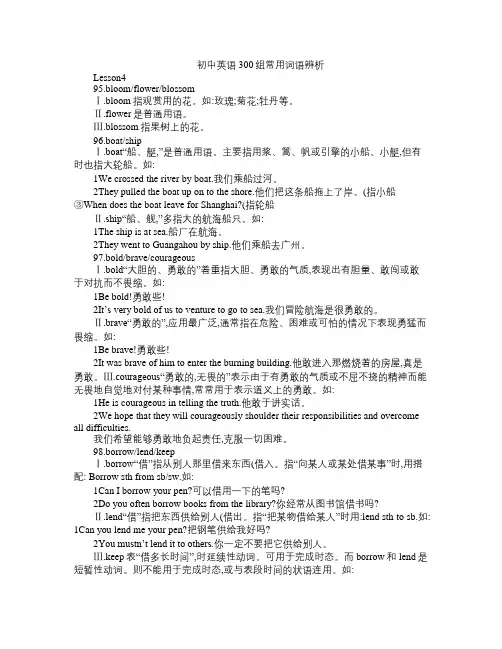
初中英语300组常用词语辨析Lesson495.bloom/flower/blossomⅠ.bloom指观赏用的花。
如:玫瑰;菊花;牡丹等。
Ⅱ.flower是普通用语。
Ⅲ.blossom指果树上的花。
96.boat/shipⅠ.boat“船、艇,”是普通用语。
主要指用浆、篙、帆或引擎的小船、小艇,但有时也指大轮船。
如:1We crossed the river by boat.我们乘船过河。
2They pulled the boat up on to the shore.他们把这条船拖上了岸。
(指小船③When does the boat leave for Shanghai?(指轮船Ⅱ.ship“船、舰,”多指大的航海船只。
如:1The ship is at sea.船厂在航海。
2They went to Guangahou by ship.他们乘船去广州。
97.bold/brave/courageousⅠ.bold“大胆的、勇敢的”着重指大胆、勇敢的气质,表现出有胆量、敢闯或敢于对抗而不畏缩。
如:1Be bold!勇敢些!2It’s very bold of us to v enture to go to sea.我们冒险航海是很勇敢的。
Ⅱ.brave“勇敢的”,应用最广泛,通常指在危险、困难或可怕的情况下表现勇猛而畏缩。
如:1Be brave!勇敢些!2It was brave of him to enter the burning building.他敢进入那燃烧着的房屋,真是勇敢。
Ⅲ.courageous“勇敢的,无畏的”表示由于有勇敢的气质或不屈不挠的精神而能无畏地自觉地对付某种事情,常常用于表示道义上的勇敢。
如:1He is courageous in telling the truth.他敢于讲实话。
2We hope that they will courageously shoulder their responsibilities and overcome all difficulties.我们希望能够勇敢地负起责任,克服一切困难。
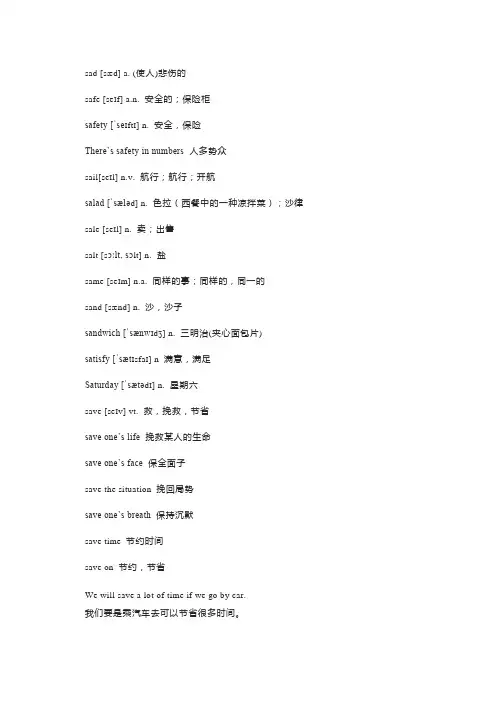
sad [sæd] a. (使人)悲伤的safe [seɪf] a.n. 安全的;保险柜safety [ˈseɪftɪ] n. 安全,保险There’s safety in numbers 人多势众sail[seɪl] n.v. 航行;航行;开航salad [ˈsæləd] n. 色拉(西餐中的一种凉拌菜);沙律sale [seɪl] n. 卖;出售salt [sɔːlt, sɔlt] n. 盐same [seɪm] n.a. 同样的事;同样的,同一的sand [sænd] n. 沙,沙子sandwich [ˈsænwɪdʒ] n. 三明治(夹心面包片)satisfy [ˈsætɪsfaɪ] n 满意,满足Saturday [ˈsætədɪ] n. 星期六save [seɪv] vt. 救,挽救,节省save one’s life 挽救某人的生命save one’s face 保全面子save the situation 挽回局势save one’s breath 保持沉默save time 节约时间save on 节约,节省We will save a lot of time if we go by car.我们要是乘汽车去可以节省很多时间。
say(said, said) [seɪ] vt. 说,讲go without saying 显而易见say to oneself 自言自语scarf[skɑːf] n. 领巾;围巾school [skuːl] n. 学校schoolbag['sku:lbæg] n. 书包science [ˈsaɪəns] n. 科学,自然科学scientist[ˈsaɪəntɪst] n. 科学家scissors [ˈsɪzəz] n. 剪刀score [skɔː(r)] n.&v. 得分;分数a score-keeper 记分员a score –sheet 记分单a score of 二十个screen [skriːn] n. 幕,荧光屏sea[siː] n. 海,海洋in the sea 在海里on the sea 在海滨by sea 乘船a sea of flames 一片火海search [sɜːtʃ] n.&v. 搜寻,搜查search for sb/sth 寻找某人/某物Rescue workers searched all night in the hope of finding more survivors.营救人员彻夜搜寻,希望找到更多的幸存者。
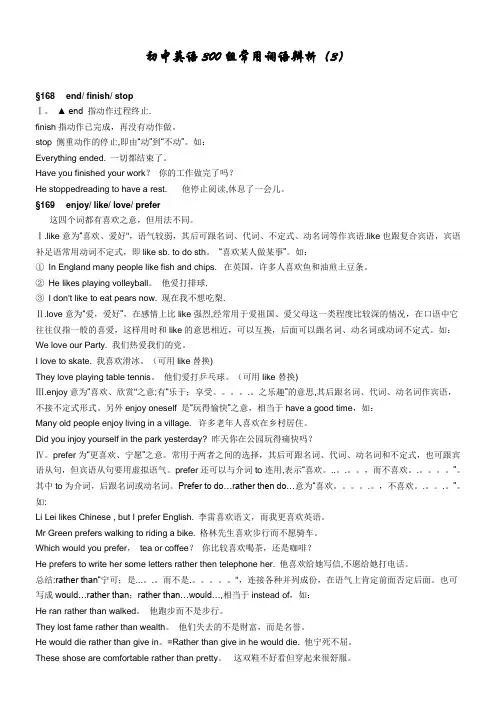
初中英语300组常用词语辨析(3)§168 end/ finish/ stopⅠ。
▲ end 指动作过程终止.finish指动作已完成,再没有动作做。
stop 侧重动作的停止,即由“动”到“不动”。
如:Everything ended. 一切都结束了。
Have you finished your work?你的工作做完了吗?He stoppedreading to have a rest. 他停止阅读,休息了一会儿。
§169 enjoy/ like/ love/ prefer这四个词都有喜欢之意,但用法不同。
Ⅰ.like意为“喜欢、爱好",语气较弱,其后可跟名词、代词、不定式、动名词等作宾语.like也跟复合宾语,宾语补足语常用动词不定式,即like sb. to do sth。
“喜欢某人做某事”。
如:①In England many people like fish and chips. 在英国,许多人喜欢鱼和油煎土豆条。
②He likes playing volleyball。
他爱打排球.③I don't like to eat pears now. 现在我不想吃梨.Ⅱ.love意为“爱,爱好”,在感情上比like强烈,经常用于爱祖国、爱父母这一类程度比较深的情况,在口语中它往往仅指一般的喜爱,这样用时和like的意思相近,可以互换,后面可以跟名词、动名词或动词不定式。
如:We love our Party. 我们热爱我们的党。
I love to skate. 我喜欢滑冰。
(可用like替换)They love playing table tennis。
他们爱打乒乓球。
(可用like替换)Ⅲ.enjoy意为“喜欢、欣赏"之意;有“乐于;享受。
.。
之乐趣”的意思,其后跟名词、代词、动名词作宾语,不接不定式形式。
另外enjoy oneself 是“玩得愉快”之意,相当于have a good time,如:Many old people enjoy living in a village. 许多老年人喜欢在乡村居住。
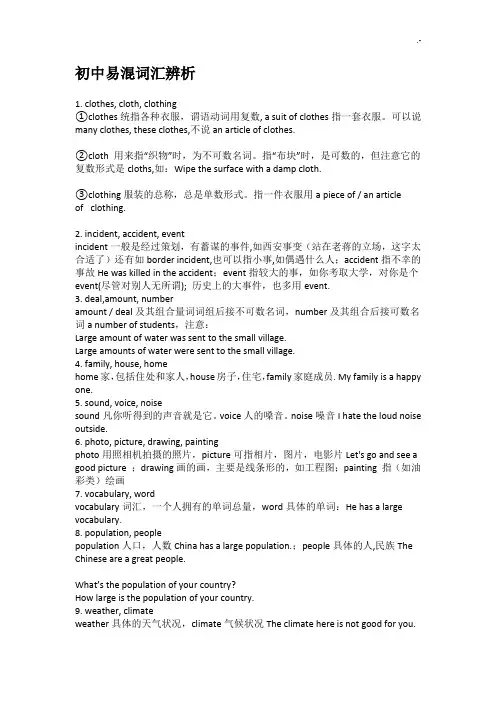
初中易混词汇辨析1. clothes, cloth, clothing①clothes统指各种衣服,谓语动词用复数, a suit of clothes指一套衣服。
可以说many clothes, these clothes,不说an article of clothes.②cloth 用来指“织物”时,为不可数名词。
指“布块”时,是可数的,但注意它的复数形式是cloths,如:Wipe the surface with a damp cloth.③clothing服装的总称,总是单数形式。
指一件衣服用a piece of / an articleof clothing.2. incident, accident, eventincident一般是经过策划,有蓄谋的事件,如西安事变(站在老蒋的立场,这字太合适了)还有如border incident,也可以指小事,如偶遇什么人;accident指不幸的事故He was killed in the accident;event指较大的事,如你考取大学,对你是个event(尽管对别人无所谓); 历史上的大事件,也多用event.3. deal,amount, numberamount / deal及其组合量词词组后接不可数名词,number及其组合后接可数名词a number of students,注意:Large amount of water was sent to the small village.Large amounts of water were sent to the small village.4. family, house, homehome家,包括住处和家人,house房子,住宅,family家庭成员. My family is a happy one.5. sound, voice, noisesound凡你听得到的声音就是它。
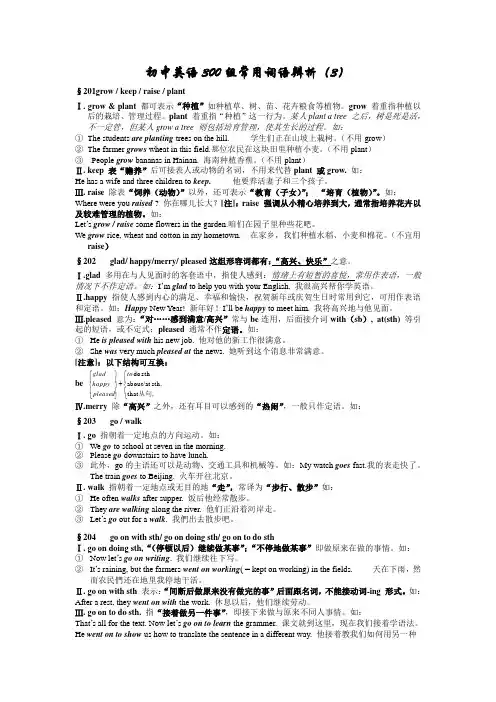
初中英语300组常用词语辨析(3)§201grow / keep / raise / plantⅠ. grow & plant 都可表示“种植”如种植草、树、苗、花卉粮食等植物。
grow 着重指种植以后的栽培、管理过程。
plant 着重指“种植”这一行为。
某人plant a tree 之后,树是死是活,不一定管,但某人grow a tree 则包括培育管理,使其生长的过程。
如:① The students are planting trees on the hill. 学生们正在山坡上栽树。
(不用grow ) ② The farmer grows wheat in this field.那位农民在这块田里种植小麦。
(不用plant ) ③ People grow bananas in Hainan. 海南种植香蕉。
(不用plant )Ⅱ. keep 表“赡养”后可接表人或动物的名词,不用来代替plant 或grow. 如: He has a wife and three children to keep. 他要养活妻子和三个孩子。
Ⅲ. raise 除表“饲养(动物)”以外,还可表示“教育(子女)”; “培育(植物)”。
如: Where were you raised ? 你在哪儿长大?[注]:raise 强调从小精心培养到大,通常指培养花卉以及较难管理的植物。
如:Let ’s grow / raise some flowers in the garden.咱们在园子里种些花吧。
We grow rice, wheat and cotton in my hometown. 在家乡,我们种植水稻、小麦和棉花。
(不宜用raise )§202 glad/ happy/merry/ pleased 这组形容词都有:“高兴、快乐”之意。
Ⅰ.glad 多用在与人见面时的客套语中,指使人感到:情绪上有短暂的喜悦,常用作表语,一般情况下不作定语。
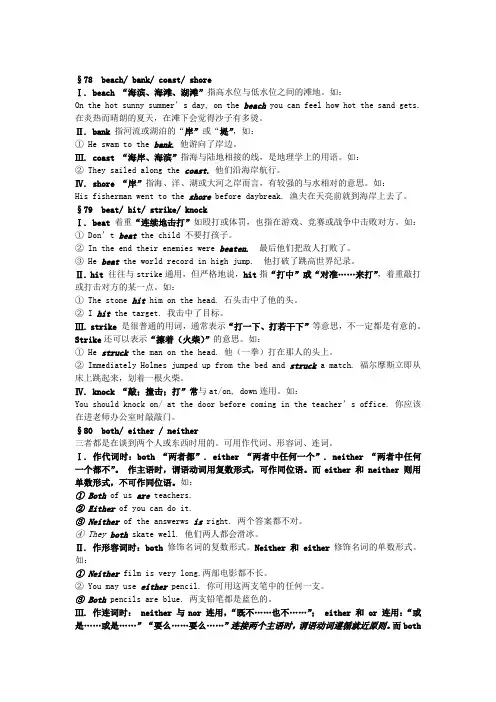
§78 beach/ bank/ coast/ shoreⅠ. beach “海滨、海滩、湖滩”指高水位与低水位之间的滩地。
如:On the hot sunny summer’s day, on the beach you can feel how hot the sand gets. 在炎热而晴朗的夏天,在滩下会觉得沙子有多烫。
Ⅱ. bank 指河流或湖泊的“岸”或“堤”,如:① He swam to the bank.他游向了岸边。
Ⅲ. coast “海岸、海滨”指海与陆地相接的线,是地理学上的用语。
如:② They sailed along the coast.他们沿海岸航行。
Ⅳ. shore “岸”指海、洋、湖或大河之岸而言,有较强的与水相对的意思。
如:His fisherman went to the shore before daybreak. 渔夫在天亮前就到海岸上去了。
§79 beat/ hit/ strike/ knockⅠ. beat 着重“连续地击打”如殴打或体罚,也指在游戏、竞赛或战争中击败对方。
如:① Don’t beat the child 不要打孩子。
② In the end their enemies were beaten.最后他们把敌人打败了。
③ He beat the world record in high jump. 他打破了跳高世界纪录。
Ⅱ. hit 往往与strike通用,但严格地说,hit指“打中”或“对准……来打”,着重敲打或打击对方的某一点。
如:① The stone hit him on the head. 石头击中了他的头。
② I hit the target. 我击中了目标。
Ⅲ. strike 是很普通的用词,通常表示“打一下、打若干下”等意思,不一定都是有意的。
Strike还可以表示“擦着(火柴)”的意思。
如:① He struck the man on the head. 他(一拳)打在那人的头上。
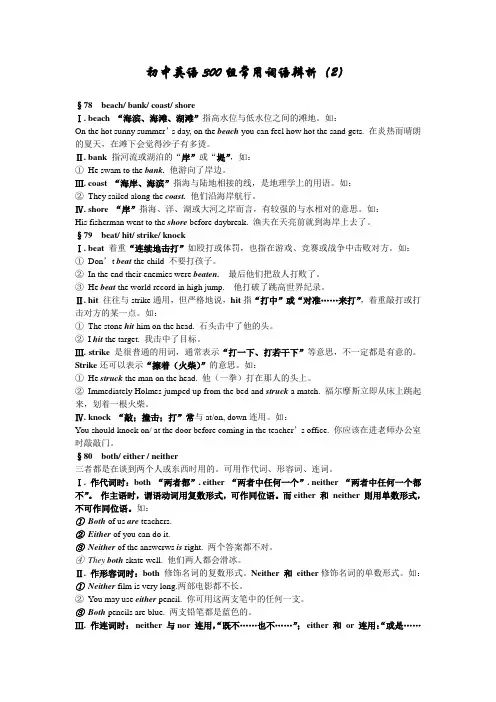
初中英语300组常用词语辨析(2)§78 beach/ bank/ coast/ shoreⅠ. beach “海滨、海滩、湖滩”指高水位与低水位之间的滩地。
如:On the hot sunny summer’s day, on the beach you can feel how hot the sand gets. 在炎热而晴朗的夏天,在滩下会觉得沙子有多烫。
Ⅱ. bank 指河流或湖泊的“岸”或“堤”,如:①He swam to the bank.他游向了岸边。
Ⅲ. coast “海岸、海滨”指海与陆地相接的线,是地理学上的用语。
如:②They sailed along the coast.他们沿海岸航行。
Ⅳ. shore “岸”指海、洋、湖或大河之岸而言,有较强的与水相对的意思。
如:His fisherman went to the shore before daybreak. 渔夫在天亮前就到海岸上去了。
§79 beat/ hit/ strike/ knockⅠ. beat 着重“连续地击打”如殴打或体罚,也指在游戏、竞赛或战争中击败对方。
如:①Don’t beat the child 不要打孩子。
②In the end their enemies were beaten.最后他们把敌人打败了。
③He beat the world record in high jump. 他打破了跳高世界纪录。
Ⅱ. hit 往往与strike通用,但严格地说,hit指“打中”或“对准……来打”,着重敲打或打击对方的某一点。
如:①The stone hit him on the head. 石头击中了他的头。
②I hit the target. 我击中了目标。
Ⅲ. strike 是很普通的用词,通常表示“打一下、打若干下”等意思,不一定都是有意的。
Strike还可以表示“擦着(火柴)”的意思。
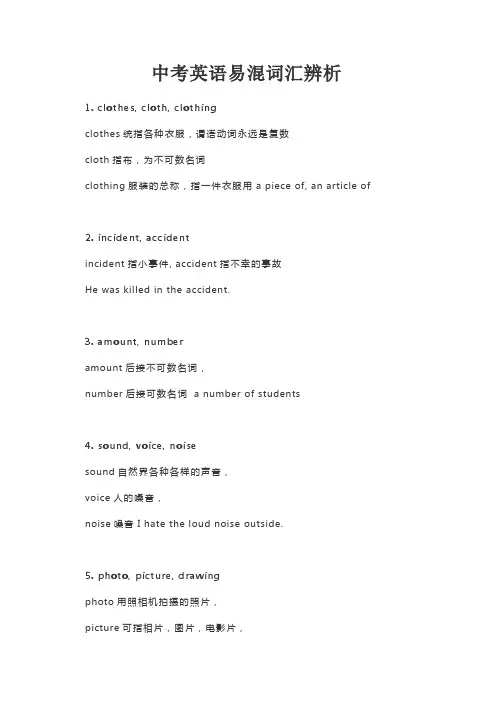
中考英语易混词汇辨析1. clothes, cloth, clothingclothes统指各种衣服,谓语动词永远是复数cloth指布,为不可数名词clothing服装的总称,指一件衣服用a piece of, an article of2. incident, accidentincident指小事件, accident指不幸的事故He was killed in the accident.3. amount, numberamount后接不可数名词,number后接可数名词 a number of students4. sound, voice, noisesound自然界各种各样的声音,voice人的嗓音,noise噪音I hate the loud noise outside.5. photo, picture, drawingphoto用照相机拍摄的照片,picture可指相片,图片,电影片,drawing画的画Let's go and see a good picture.6. weather, climateweather一天内具体的天气状况,climate长期的气候状况The climate here is not good for you.7. road, street, path, wayroad具体的公路,马路,street街道,path小路,小径,way道路,途径take this road; in the street, show me the way to the museum.8. course, subjectcourse课程(可包括多门科目),subject科目(具体的学科)a summer course9. custom, habitcustom传统风俗,习俗,也可指生活习惯,后接to do,habit生活习惯,习惯成自然,后接of doing.I've got the habit of drinking a lot.10. cause, reasoncause指造成某一事实或现象的直接原因,后接of sth./doing sth,reason用来解释某种现象或结果的理由,后接for sth./doing sth. the reason for being late11. exercise, exercises, practiceexercise运动,锻炼(不可数),exercises练习(可数),practice(反复做的)练习Practice makes perfect.12. class, lesson作"课"解时,两者可以替换.指课文用lesson.指班级或全体学生用class. lesson 6; class 513. speech, talk, lecturespeech指在公共场所所做的经过准备的较正式的演说,talk日常生活中的一般的谈话,讲话,lecture学术性的演讲,讲课 a series of lecture on…14. work, job二者均指工作。
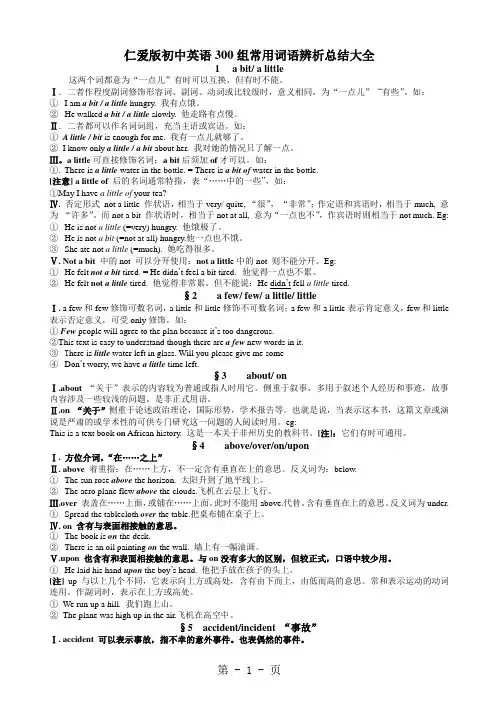
仁爱版初中英语300组常用词语辨析总结大全1 a bit/ a little这两个词都意为“一点儿”有时可以互换,但有时不能。
Ⅰ.二者作程度副词修饰形容词、副词、动词或比较级时,意义相同,为“一点儿”“有些”。
如:①I am a bit / a little hungry. 我有点饿。
②He walked a bit / a little slowly. 他走路有点慢。
Ⅱ.二者都可以作名词词组,充当主语或宾语。
如:① A little / bit is enough for me. 我有一点儿就够了。
②I know only a little / a bit about her. 我对她的情况只了解一点。
Ⅲ。
a little可直接修饰名词;a bit后须加of才可以。
如:①.There is a little water in the bottle. = There is a bit of water in the bottle.[注意]a little of后的名词通常特指,表“……中的一些”,如:①May I have a little of your tea?Ⅳ. 否定形式not a little 作状语,相当于very/ quite, “很”,“非常”;作定语和宾语时,相当于much, 意为“许多”。
而not a bit 作状语时,相当于not at all, 意为“一点也不”,作宾语时则相当于not much. Eg:①He is not a little (=very) hungry. 他饿极了。
②He is not a bit (=not at all) hungry.他一点也不饿。
③She ate not a little (=much). 她吃得很多。
Ⅴ. Not a bit中的not 可以分开使用;not a littl e中的not 则不能分开。
Eg:①He felt not a bit tired. = He didn’t feel a bit tired. 他觉得一点也不累。
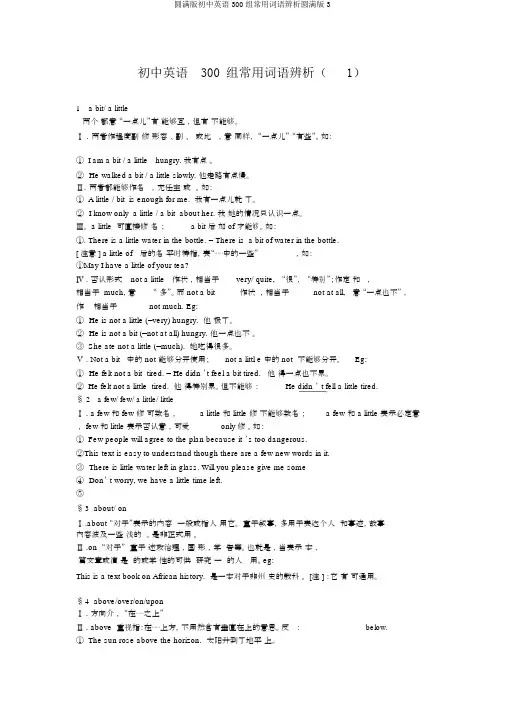
初中英语 300 组常用词语辨析(1)1 a bit/ a little两个都意“一点儿”有能够互,但有不能够。
Ⅰ .两者作程度副修形容、副、或比,意同样,“一点儿” “有些”。
如:① I am a bit / a little hungry. 我有点。
②He walked a bit / a little slowly. 他走路有点慢。
Ⅱ.两者都能够作名,充任主或。
如:① A little / bit is enough for me. 我有一点儿就了。
②I know only a little / a bit about her. 我她的情况只认识一点。
Ⅲ。
a little 可直接修名; a bit 后加 of 才能够。
如:①. There is a little water in the bottle. = There is a bit of water in the bottle.[ 注意 ] a little of后的名平时特指,表“⋯⋯中的一些”,如:①May I have a little of your tea?Ⅳ . 否认形式not a little作状,相当于very/ quite,“很”,“特别”;作定和,相当于 much, 意“ 多”。
而not a bit作状,相当于not at all,意“一点也不” ,作相当于not much. Eg:①He is not a little (=very) hungry. 他极了。
②He is not a bit (=not at all) hungry. 他一点也不。
③ She ate not a little (=much). 她吃得很多。
Ⅴ . Not a bit中的not能够分开使用;not a littl e 中的 not 不能够分开。
Eg:①He felt not a bit tired. = He didn ’t feel a bit tired. 他得一点也不累。
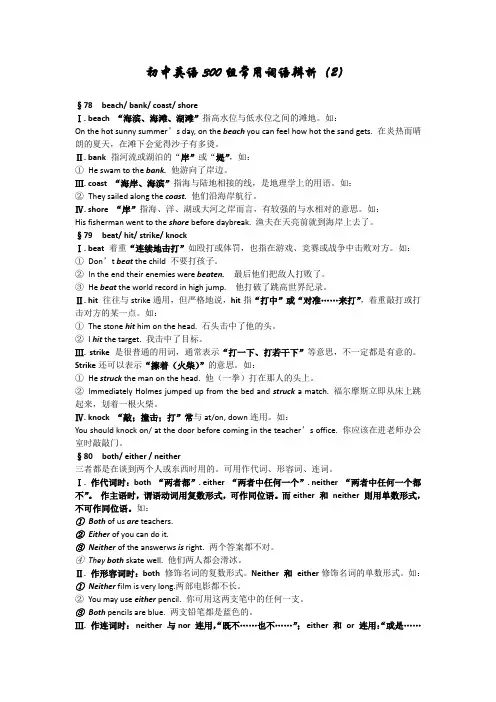
初中英语300组常用词语辨析(2)§78 beach/ bank/ coast/ shoreⅠ. beach “海滨、海滩、湖滩”指高水位与低水位之间的滩地。
如:On the hot sunny summer’s day, on the beach you can feel how hot the sand gets. 在炎热而晴朗的夏天,在滩下会觉得沙子有多烫。
Ⅱ. bank 指河流或湖泊的“岸”或“堤”,如:①He swam to the bank.他游向了岸边。
Ⅲ. coast “海岸、海滨”指海与陆地相接的线,是地理学上的用语。
如:②They sailed along the coast.他们沿海岸航行。
Ⅳ. shore “岸”指海、洋、湖或大河之岸而言,有较强的与水相对的意思。
如:His fisherman went to the shore before daybreak. 渔夫在天亮前就到海岸上去了。
§79 beat/ hit/ strike/ knockⅠ. beat 着重“连续地击打”如殴打或体罚,也指在游戏、竞赛或战争中击败对方。
如:①Don’t beat the child 不要打孩子。
②In the end their enemies were beaten.最后他们把敌人打败了。
③He beat the world record in high jump. 他打破了跳高世界纪录。
Ⅱ. hit 往往与strike通用,但严格地说,hit指“打中”或“对准……来打”,着重敲打或打击对方的某一点。
如:①The stone hit him on the head. 石头击中了他的头。
②I hit the target. 我击中了目标。
Ⅲ. strike 是很普通的用词,通常表示“打一下、打若干下”等意思,不一定都是有意的。
Strike还可以表示“擦着(火柴)”的意思。
初中英语300组常用词语辨析(3)§168 end/ finish/ stopⅠ. ▲ end 指动作过程终止。
finish指动作已完成,再没有动作做。
stop 侧重动作的停止,即由“动”到“不动”。
如:Everything ended. 一切都结束了。
Have you finished your work? 你的工作做完了吗?He stoppedreading to have a rest. 他停止阅读,休息了一会儿。
§169 enjoy/ like/ love/ prefer这四个词都有喜欢之意,但用法不同。
Ⅰ.like意为“喜欢、爱好”,语气较弱,其后可跟名词、代词、不定式、动名词等作宾语。
like也跟复合宾语,宾语补足语常用动词不定式,即like sb. to do sth. “喜欢某人做某事”。
如:①In England many people like fish and chips. 在英国,许多人喜欢鱼和油煎土豆条。
②He likes playing volleyball. 他爱打排球。
③I don’t like to eat pear s now. 现在我不想吃梨。
Ⅱ.love意为“爱,爱好”,在感情上比like强烈,经常用于爱祖国、爱父母这一类程度比较深的情况,在口语中它往往仅指一般的喜爱,这样用时和like的意思相近,可以互换,后面可以跟名词、动名词或动词不定式。
如:We love our Party. 我们热爱我们的党。
I love to skate. 我喜欢滑冰。
(可用like替换)They love playing table tennis. 他们爱打乒乓球。
(可用like替换)Ⅲ.enjoy意为“喜欢、欣赏”之意;有“乐于;享受。
之乐趣”的意思,其后跟名词、代词、动名词作宾语,不接不定式形式。
另外enjoy oneself 是“玩得愉快”之意,相当于have a good time,如:Many old people enjoy living in a village. 许多老年人喜欢在乡村居住。
(完整)初中英语易混词汇辨析(完整)初中英语易混词汇辨析编辑整理:尊敬的读者朋友们:这里是精品文档编辑中心,本文档内容是由我和我的同事精心编辑整理后发布的,发布之前我们对文中内容进行仔细校对,但是难免会有疏漏的地方,但是任然希望((完整)初中英语易混词汇辨析)的内容能够给您的工作和学习带来便利。
同时也真诚的希望收到您的建议和反馈,这将是我们进步的源泉,前进的动力。
本文可编辑可修改,如果觉得对您有帮助请收藏以便随时查阅,最后祝您生活愉快业绩进步,以下为(完整)初中英语易混词汇辨析的全部内容。
本试卷共26页,第1页本试卷共26页,第2页初中英语易混易错词汇总结补充1。
clothes, cloth, clothingclothes统指各种衣服,谓语动词永远是复数, cloth指布,为不可数名词 clothing服装的总称,指一件衣服用 a piece of, an article of2. incident, accidentincident指小事件, accident指不幸的事故He was killed in the accident。
3。
amount, numberamount后接不可数名词, number后接可数名词 a number of students4. sound, voice, noisesound自然界各种各样的声音,voice人的嗓音,noise噪音I hate the loud noise outside.5. photo, picture, drawingphoto用照相机拍摄的照片,picture可指相片,图片,电影片,drawing画的画Let’s go and see a good picture。
6. weather, climateweather一天内具体的天气状况,climate长期的气候状况 The climate here is not good for you。
初中英语300组常用词语辨析完整版(1) 初中英语300组常用词语辨析完整版(1)内容摘要:Lesson11. a bit/ a little这两个词都意为”一点儿有时可以互换,但有时不能。
Ⅰ.二者作程度副词修饰形容词、副词、动词或比较级时,意义相同,为”一点儿“有些。
如① I am a bit / a little hungry. 我有点饿。
② He walked a bit / a little slowly. 他走路有点慢。
Ⅱ.二者都可以作名词词组,充当主语或宾语。
如① A little / bit is enough for me. 我有一点儿就够了。
② I know only a little / a bit about her. 我对她的情况只了解一点。
Ⅲ。
a little 可直接修饰名词;a bit 后须加 of 才可以。
如①. There is a little water in the bottle. = There is a bit of water in the bottle.[注意] a little of 后的名词通常特指,表”........中的一些。